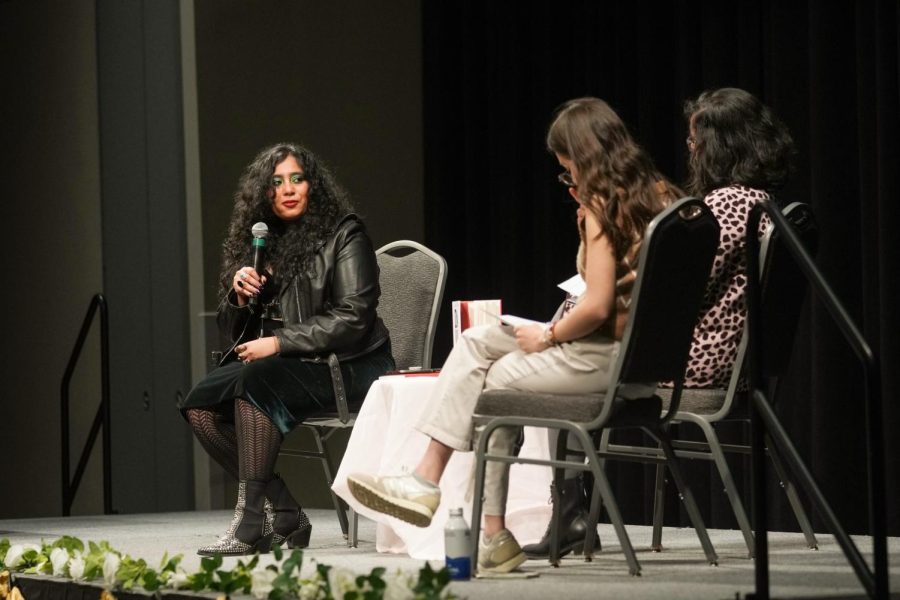After VSG Senate unanimously passed a bill advocating for adding protection against caste discrimination into Vanderbilt’s Non-Discrimination Policy on Feb. 22, VSG leaders have been working with university administration to implement this policy addition. As part of ongoing conversations about caste discrimination, the South Asian Cultural Exchange held dialogue groups and hosted Yashica Dutt — an anti-caste expert and journalist — for a March 8 speaker event.
The bill explains that caste is an ancient Indian social hierarchy that classifies people based on the history of family occupation and religious duties.
“To this day, it is a system that pervades South Asia and the diaspora and is not confined to India,” the bill states.
According to the Pew Research Center, South Asians are born into their caste and retain that identity for their lifetime. There are five caste groups: Brahmins, Kshatriyas, Vaisyas, Sudra and Dalits. The Dalit group are workers who have historically held some of the most undesirable jobs in society, and they are often referred to as “untouchable.” The Brahmin caste is the highest caste; members of this caste are historically priests and educators. Caste is usually determined by a person’s last name, the region of South Asia they are from, their economic status and education level.
SACE Outreach Co-Chair Min Kalsikam, a junior, said caste-based discrimination is being brought to attention in various city and state governments across the nation. Seattle became the first city in the U.S. to ban caste-based discrimination after a city council vote on Feb. 21.
Kalsikam added that, until recently, there was not much awareness about caste-based discrimination among non-South Asian populations because caste is not obvious just by looking at a person.
“Caste isn’t something that is visible on your body,” Kalsikam said. “Because people don’t really know about caste, it is much easier to discriminate against people based on caste.”
VSG anti-caste discrimination bill
The bill was proposed by SACE Outreach Co-Chair Gayatri Aluri, Kalasikam, Hidden Dores President Induja Kumar, Student Body Vice President Ari Sasson and VSG Speaker of the Senate Angela Yan — all of whom are juniors. The bill was co-sponsored by 26 entities.
“About 18.8% of Vanderbilt undergraduate students are Asian, with a significant portion of those students being South Asian Americans; thereby, caste discrimination is a problem that is heavily pertinent to the South Asian community at Vanderbilt,” the bill states.
According to the Student Handbook, anti-discrimination policies apply to educational and athletic programs, admissions policies, scholarship and loan programs and employment. If violated, students may submit a report to the Equal Opportunity and Access Office which will investigate and administer sanctions appropriately.
“Leaders in Equal Opportunity and Access, Equity, Diversity and Inclusion, Student Affairs and the Office of the General Counsel are coordinating and look forward to engaging with Vanderbilt Student Government members to discuss the resolution, the university’s policy, and relevant programmatic/educational initiatives,” a university representative said in an email to The Hustler.
The bill states that it is the first of its kind among universities in the South. Schools such as Harvard University, Brown University, Colby College, Brandeis University and those in the California state system have banned caste discrimination in their policies.
“I voted yes on the bill because it brought an issue to light I felt like doesn’t get discussed enough,” Hank Ingram Senator Maya Nachega, a first-year, said. “It was a well-researched bill with a lot of care and thought put behind it.”
Kumar said they felt particularly happy about the bill passing because of the encouragement the bill proposers received from the student body. They said the bill serves as a role model for other VSG efforts surrounding diversity, equity and inclusion.
“I think a lot of what we’re trying to do is increase awareness of caste inside the diaspora and outside,” Kumar said. “[Hearing] non-South-Asian students saying, ‘This is an issue that I care about,’ was a really powerful feeling.”
Yashica Dutt speaker event
At the SACE event, Dutt educated audience members about caste-based discrimination as well as her experiences as a Dalit woman in the United States. The event was moderated by sophomore Aaditi Lele and senior lecturer in Asian Studies Divya Chaudhry. Aaditi Lele serves as the News Editor of The Hustler.
“[Caste-based discrimination] is a human rights struggle that is now here in the United States,” Dutt said. “Finally, we are now able to pay attention to it.”
Dutt explained how common South Asian traditions intersect with caste, such as arranged marriages, and especially affect women. According to Dutt, marriages are often arranged so that parents can ensure their children are marrying within their caste.
“As a Dalit woman, I have to work many more times harder than a Dalit man to make myself heard. I am constantly policed on what I can say, how I can say it, how I can dress, whose ideas I can support and how much support I can get from organizations,” Dutt said. “Any system of exclusion will give the least power to the people who are most subjugated.”
Dutt also discussed how discussions about caste discrimination often focus on discrimination against Dalits due to the idea of untouchability. According to Dutt, only Dalits are considered untouchable, with members of the upper caste refusing to be in their presence because of their “impurity.”
“If you’re a Dalit, people might not share food with you because your touch is considered impure,” Dutt said. “If you’re a Dalit, people might not come to your house and drink a glass of water from your glasses because they’ve touched your mouth and, by extension, since your being is impure, your house is impure. This concept is exclusive to untouchable people.”
SACE Media Relations Co-Chair Tri Shriram, a sophomore, said she found the event informative.
“[Dutt] was clearly educated on the subject and passionate about the topic which made the event really enjoyable,” Shriram said. “I learned a lot about the microaggressions that take place that I was never aware of like the patting of men’s shoulders to see if they are wearing the Brahmin thread and the amount of caste discrimination that takes place in the United States.”
Since January, SACE has been holding monthly reading groups based on caste unlearning, where students read, watch and discuss materials about casteism. Aluri and Kalsikam said they hope that anti-caste discrimination efforts continue to gain traction at Vanderbilt and nationwide.
“In our conversations with Yashica Dutt before, during and after the talk, there was a lot of emphasis on the importance of upper caste folks showing up for Dalit folks and making sure that we as people who benefit from this privilege don’t allow the everyday casteism that manifests in everyday speech, language and attitudes,” Aluri said. “It’s really important that we check those biases and do the work of keeping students as safe and as celebrated as possible.”













